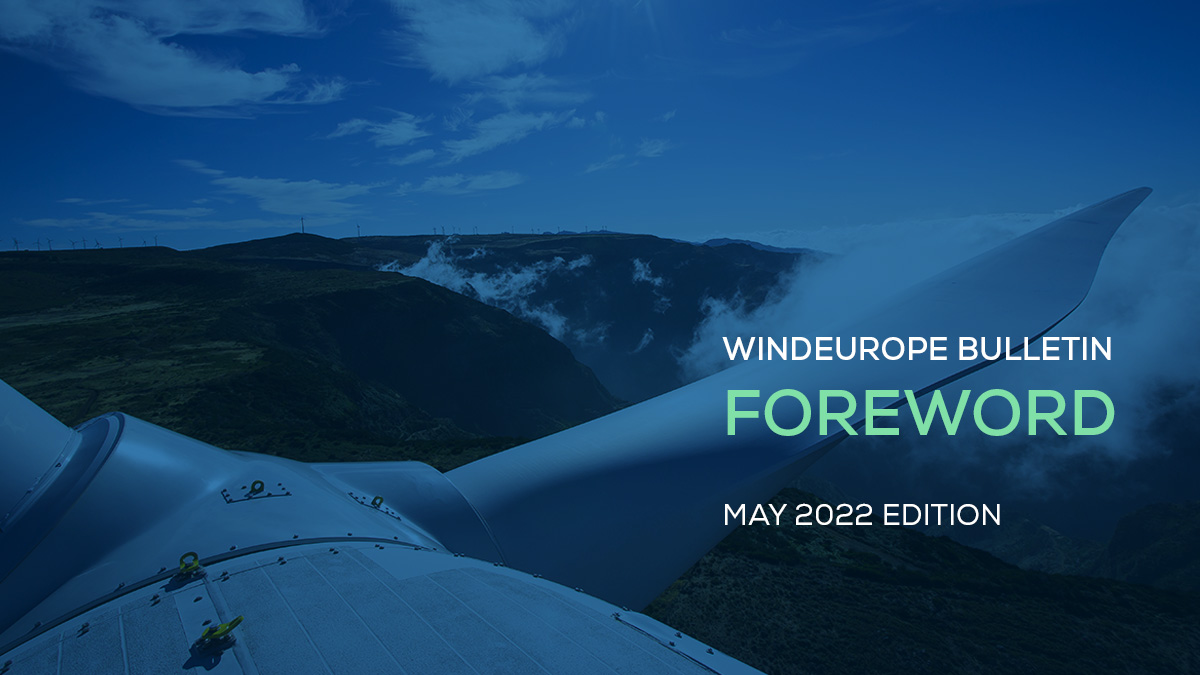News
WindEurope CEO on the RePowerEU Action Plan and the Financial Outlook

6 May 2022
CEO Foreword
Dear Member,
Thank you first of all to all of you who came to WindEurope’s Annual Event in Bilbao last month. It was great to see such a diverse turnout from right across the industry and beyond. And to show Government representatives how committed the wind industry is to delivering energy security for Europe. We’ll be heading to Copenhagen for the next WindEurope Annual Event, 25-27 April 2023. We hope to see many of you there again.
The proceedings from the conference are available here. You can get the password from this Members Area page. If you have trouble logging in, please get in touch with the WindEurope conference team.
The event came at a crucial time for Europe’s energy strategy. Russia’s invasion of Ukraine has put energy security centre-stage. In response the EU agreed in March its newly issued REPowerEU energy policy: no more Russian energy imports by 2027, 2/3 reduction in Russian gas imports already this year; an accelerated expansion of renewables, heat pumps, EVs and renewable hydrogen; and simplification of permitting processes to achieve that. REPowerEU envisages the EU expanding its wind energy capacity from 190 GW today to 480 GW in 2040.
The EU Commission will now issue a REPowerEU Action Plan on 18 May with detailed measures. This will include new Guidance to National Governments on how exactly they can simplify their permitting rules and procedures. Plus new legislation that will enshrine the EU’s new principle that the expansion of renewables is a matter of overriding public interest – and a requirement for national Governments to identify go-to areas for the rapid deployment of wind and solar with light-touch permitting.
Thanks in part to the permitting problems, Europe’s wind supply chain is under huge strain at the moment. Because there aren’t enough permitting projects the market is only half the size it should be. We expect the EU to install 18 GW a year over the next 5 years. But it needs to build 35 GW a year to deliver the REPowerEU plan. The supply chain is of course also hurting because key materials and components are harder to source and are more expensive – in part because of the EU’s trade policy.
This calls for a robust policy response. As well as tackling permitting, National Governments need to use non-price criteria in their wind energy auctions. These would give an edge to projects doing the right things on sustainability, energy system integration, and sourcing European content. All of which would help us to “re-shore” wind manufacturing to Europe. This is central to meeting Europe’s energy security challenge: using home grown energy produced with technology made in Europe.
Even with these challenges, the finance sector continues to trust in our technology and industry. Europe invested €41bn in new wind farms in 2021. This financed 25 GW of new capacity, including 19 GW in the EU. It was also a record year for corporate renewable PPAs with 6.9 GW of deals announced, 60% of them in wind. This isn’t enough to meet Europe’s climate and energy objectives of course, but it shows that availability of finance is not a problem – so long as Europe doesn’t temper with its electricity market rules.
The energy crisis has led some Governments to question electricity market rules – particularly how electricity prices are set. Spain and Portugal have now even secured a major exemption to market rules to cap the price of gas for the production of electricity. These uncoordinated market interventions are of course unhelpful – they undermine investor confidence. WindEurope has called for adjustments to Europe’s market rules for a decarbonised and secure energy system. But not a fundamental overhaul that would freeze investments. See our new position on electricity market design here. And our annual Financing and investments trends report here.
A quick look ahead now to the next few weeks. The Renewable Hydrogen Summit takes place in Brussels on 31 May. Renewable hydrogen will be a key ingredient in cutting Europe’s dependence on fossil fuel imports – notably for those parts of heavy industry and transport that cannot be decarbonised via direct electrification. The Summit will feature top policymakers and CEOs. More information is here.
And the annual WindEurope Technology Workshop on Resource Assessment and Analysis of Operating Wind Farms takes place in Brussels on 23-24 June. Registration opened this week. The Technology Workshop is a great showcase for the current state of wind energy technology. This year it’s especially important. Innovation and technology development will be central to our helping Europe to achieve energy security, notably by optimising the performance and efficiency of wind farms, which will be the focus of the Workshop. Click here to sign up.
Kind regards,

Giles Dickson
Want to read more and receive our regular newsletters?

